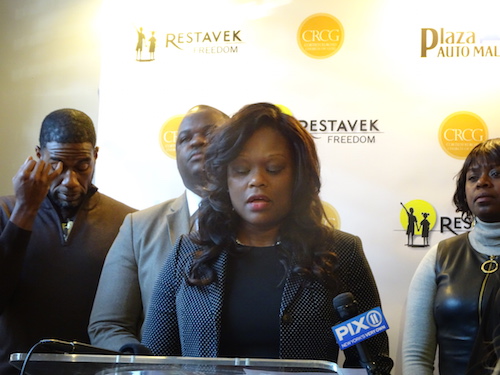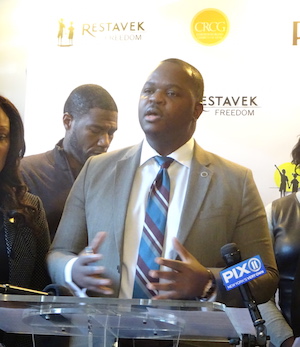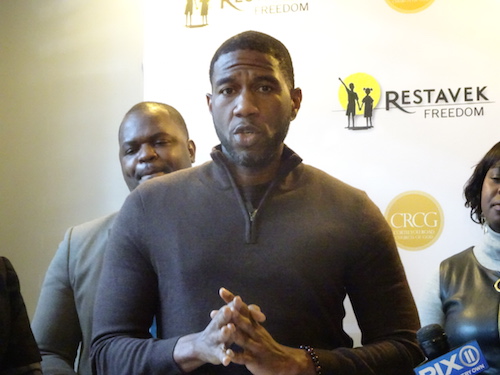Brooklyn’s elected officials joined religious leaders and activist groups yesterday, December 10, – known internationally as Human Rights Day – for a press conference announcing a new campaign to train 100 workers to accommodate victims of human trafficking, particularly Haitian and Haitian-American ones.
The press conference was held at the Cortleyou Road Church of God, 1085 Flatbush Avenue. Among the elected officials in attendance were Congresswoman Yvette Clarke (D-Crown heights, Flatbush, East Flatbush, Brownsville, Sheepshead Bay), Assembly Member Rodneyse Bichotte (D-Flatbush, Ditmas Park, City Council Member Jumaane Williams (D-Flatbush, East Flatbush, Midwood) amd Democratic District Leader Josue Pierre,
Also in attendance was Cortelyou Road Church of God (CRCG) Ministries Pastor Diane Jacques St. Surin, and the organizations Cortelyou CARES and Restavek Freedom.
“I think in order for this day to mean something, we have to do something meaningful with it, or else it’s just another day,” said Williams. “We cannot merely live our own comfortable lives while turning a blind eye to the things that are going on.”

At the conference, the speakers talked about a specific subset of human trafficking victims, called “Restavek”. The term is used to describe Haitian children who have been sent to work as a domestic servant in another household, typically because their parents lack the necessary resources to raise them.
“[Restaveks] are not treated like the rest of the family,” said Pierre. “The situation is almost akin to being a serf or a slave, so they don’t necessarily live to the same standard of living. And sometimes – very often, actually – they can be sexually harassed, used essentially as sex slaves and servants in the home.”
Today, said Bichotte, there are roughly 300,000 children in Haiti who are living as Restavek.
“Haiti is among the top ten nations on the Global Slavery Index,” said Bichotte. “We must work to correct that. And we must also work to protect the Haitians living here in Brooklyn.”

The problem, said Fabiola Desmont of the Restavek Freedom Foundation, hasn’t confined itself to Haiti; it has trickled into Brooklyn, particularly East Flatbush, which is home to one of the largest populations of Haitian immigrants in New York City. The neighborhood, where Desmont herself was born and raised, is home to a sizable population of Haitian immigrants, many of whom suffer from PTSD due to their harrowing experiences in child slavery.
“This is an issue we can no longer ignore, particularly in the community that I call home,” said Desmont. “Our goal today is not just to talk about this, but to make this a movement. We must move this issue forward, so that people who experience trauma, who were Restaveks in Haiti, who are now living with the symptoms of it, have a space for people to hear their stories, and have opportunities to create something new.”
The press conference featured testimony from Nadine [last name not used to protect her identity], a former Restavek from Haiti who was forced to work in a factory that produced bootleg designer clothes. Today, she works as a fashion designer in America, turning the skills she acquired as a Restavek into a career. Nadine, the mother of two sons, wants to ensure that the next generation won’t have to suffer what she suffered through.
“I’d like to have my children live by the standards that they were meant to live by,” said Nadine. “And it’s not just me; there are others out there that I don’t know of who may be worse off than I was.”
The newly announced campaign will involve the selection and training of 100 public service workers in the neighborhood of East Flatbush. The workers will be taught how to identify former Restaveks, and how to properly provide counseling for them.
“We’re gonna train them on cultural sensitivity, but also on human trafficking,” said Desmont. “We’re going to look at who the leaders are in this community, and train them so that they understand mental health, they understand human trafficking, and they understand what to look for.”
To contribute to the campaign, Plaza Auto Mall has donated a car to CRCG Ministries. The car will be used as a special prize in an electronics auction held by CRCG, the proceeds of which will go towards their training campaign. Auctioneers will be given raffle tickets, and the car will be awarded to the auctioneer with the winning ticket.
Desmont concluded the press conference by reminding attendees that the solution to Restavek won’t be easy to come by; the problem is both immense and multifaceted, necessitating the participation of everyone in the community.
“It’s not so simple, because the issue of human trafficking is complex,” said Desmont. “It’s mental health we’re gonna be looking at. It’s literacy we’re gonna be looking at. It’s so many facets. That’s why training our leaders is so important and critical… so that we can have a clear sense of not just the red flags specific to human trafficking globally, but specific to the Haitian population.”






